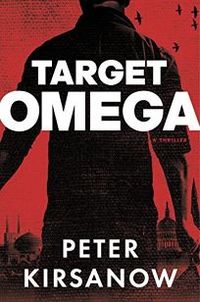Target Omega by Peter Kirsanow
 Friday, October 20, 2017 at 9:34AM
Friday, October 20, 2017 at 9:34AM 
Published by Dutton on May 16, 2017
So many characters in Target Omega are familiar that I kept picturing the character actors who were playing them as the novel progressed. The plot also follows a predictable path, although it does make the reader guess about a the identity of a mole. Readers should be warned that key plot points are left unresolved, presumably as a means of encouraging the purchase of the next book in the series.
Mike Garin is one of the elite, ultra-competent tough guy superheroic killing machines who populate Thrillerworld. If he touches a knife, he kills someone with it. If he touches a gun, he tells gun-porn addicts exactly what kind of gun he is fondling. Like most superheroic killing machines, he’s been so busy learning how to kill that he hasn’t developed anything approaching a personality. Garin is really too dull to care much about. But he's big and handsome and so the ladies love him.
With the help of his Omega team, Garin starts the novel by taking out an Iranian assault force that is attempting to snatch nuclear weapons in Pakistan. Omega is a strike force that takes direct action to prevent the proliferation of WMDs. Garin soon learns from Clint Laws, his former boss and the founder of Omega, that U.S. intelligence and special ops services have been “compromised at the highest level.” Of course, it’s up to Garin to plug the leaks, which means plugging the leaker. So far, this is a standard and unimaginative thriller plot.
Laws warns Garin that an unknown enemy will soon begin targeting Omega. Even as he speaks, Omega members are being assassinated, leaving all but Garin dead. Fortunately for the plot, the killers take a smart approach to killing the other team members but are inexplicably inept when they try to kill Garin. Of course, they had to be or the story would end in stillbirth. Peter Kirsanow explains that Garin’s assassination was assigned to less competent killers for reasons that make little sense, but Kirsanow needed to keep Garin alive or the book would end prematurely, so I swallowed my disbelief and kept reading.
Garin soon learns that a plot has been hatched to attack the US with an EMP strike. Throughout the novel we’re told that Iran can’t hit the United States and Russia knows better, so the question is how the attack will be carried out. The answer is moderately clever. The reader is also expected to wonder which high-level character is a traitor. Unfortunately, the answer is not revealed before the book ends. The true nature of the scheme against America, which is carefully concealed, has also been saved for a future volume. Both of those elements are sufficiently intriguing that I’ll probably read the next installment.
The novel is replete with simplistic political dogma that I could have lived without. The United States and Israel are always right, no matter what, and anyone who disagrees must be a liberal traitor. Characters are one-dimensional, either really really good or really really bad. Parts of the story are wholly unrealistic (in addition to Garin’s unrealistic ability to be a one-man death squad). A character makes the kind of disparaging anatomical references during Senate testimony that people just don’t make during Senate testimony (nor should they, since disparaging the size of a man’s equipment because you disagree with his political analysis is infantile). A mother tells Garin not to worry about the six men he just killed in front of her children because kids are resilient and watching someone’s head explode really won’t bother them by next week. Wow, what a great mom. The message that “real men fondle nurses” struck me as childish, although a shocking number of men do seem to think that fondling women without their consent is proof of their manhood. The last chapters seem designed to foster the idea that designer wars are a good idea and the world would be a better place if the United States orchestrated more of them, which struck me as hopelessly naïve. But it did give Kirsanow an opportunity to describe America's arsenal in salivating detail.
Kirsanow’s prose is muscular and the story zips along at a pace that makes Target Omega easy to read. Readers who want a fast-moving thriller and aren’t looking for depth or originality might enjoy Target Omega, particularly if they agree with its simplistic political viewpoint. I can’t say I didn’t enjoy Target Omega because it does push many of the right thriller buttons, but the novel has too many eye-rolling aspects to warrant a heartfelt recommendation.
RECOMMENDED WITH RESERVATIONS



